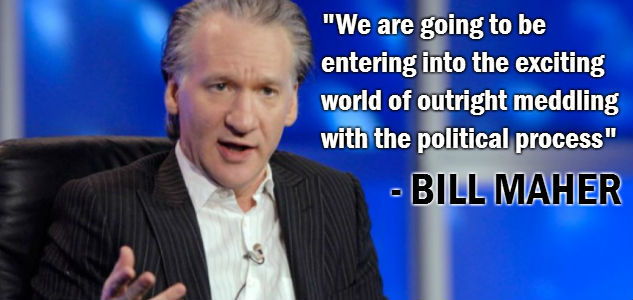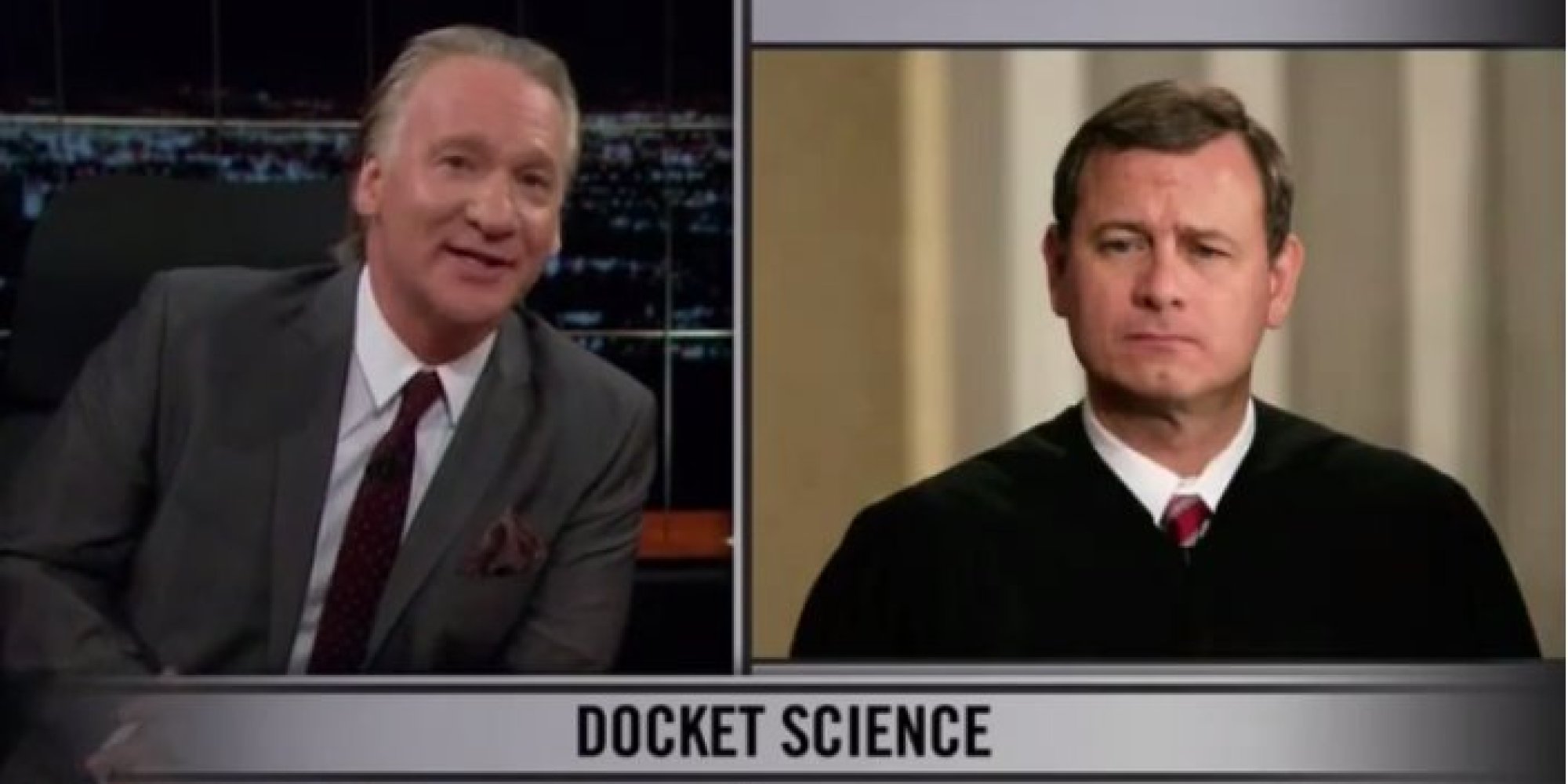
HBO’s controversial liberal comedian Bill Maher is going to press Citizens United fight. Ballot Access News has discussed Maher’s plan in its latest post, “Bill Maher To Become Poster Child for Defenders of Citizens United” written by guest writer and election expert.
Richard Pildes. Maher plans to turn his loyal followers into a political force to help defeat a candidate, yet to be chosen, who is supporting and defending the Citizens United decision made by the Supreme Court. Take a look at this excerpt from Ballot Access News:
Bill Maher’s announcement that he will use his HBO show to try to defeat a House incumbent will soon become Exhibit A for those defending the Supreme Court’s controversial Citizens United decision. Why? Because the restrictions on corporate election spending in the McCain-Feingold law specifically exempted “media” corporations. To critics of the law, this special treatment of media corporations (leaving aside all the difficulties of how to define the media in the digital age) was always one of the reasons the restrictions on other corporate election spending should be considered unconstitutional. The Supreme Court majority specifically pointed out this different treatment of different corporate entities in the law.

For a critical analysis from the perspective of constitutional law of McCain-Feingold’s different treatment of media and non-media corporations, see this important article in the Yale Law Journal by Michael McConnell.
Also, according to the New York Times, Maher’s campaign could have a sizable impact if it sticks to its plan to support the repeal of Citizens United:
After some culling and analysis, one member of Congress will be selected, and the show will follow up through November with examples of what it considers terrible work by that representative. Mr. Maher will make occasional visits to that member’s district to perform stand-up and generally stir up hostile feelings toward the show’s target. “This year, we are going to be entering into the exciting world of outright meddling with the political process,” Mr. Maher said in an email message.
The project — which the show is calling the “flip the district” campaign — is intended to get real results, said Scott Carter, the show’s executive producer. Among the criteria for selecting a representative, other than some degree of outrageousness in statements or voting record, is that the member be in a truly competitive race. Those running unopposed will not be selected, no matter how egregious the show’s fans may claim them to be.
“We want the chance to win,” Mr. Carter said. The choice may be a Republican or a Democrat, though he acknowledged, “with our viewers voting, I imagine it is much more likely we will pick a Republican.”
A question arises however, with whether using his television show for campaigning violates election law. A great article in Variety by Senior Editor Ted Johnson takes a look at previous Federal Election Commission decisions on similar issues including the case of satirical comedian Stephen Colbert who made headlines for his Comedy Central show, “The Colbert Report”, by running ads against money in politics during the 2012 Presidential elections. According to the Variety article:
There is a precedent for such “meddling”: Stephen Colbert, who created a SuperPAC for the 2012 cycle, ran humorous ads and made light of the state of money in politics. But he first sought an opinion from the Federal Election Commission, which said that while production of segments for Comedy Central’s “The Colbert Report” fell under a press exemption, other activities, like the creation of ad spots, did not. It didn’t mean that Colbert couldn’t create the ad spots, just that any Viacom expenditure had to be disclosed.
 Trevor Potter, the Caplin and Drysdale election law attorney who represented Colbert, said that “as long as (Maher) is talking about candidates on the show, it will all be subject to the press exemption. There will be no restrictions on what he can say on his show.”
Trevor Potter, the Caplin and Drysdale election law attorney who represented Colbert, said that “as long as (Maher) is talking about candidates on the show, it will all be subject to the press exemption. There will be no restrictions on what he can say on his show.”
“What he has got to be careful of, and has to think through, is if he gets active in a campaign in ways that are different from what he would do as a member of the press with his regular television show,” says Potter, a former chairman of the FEC and president and general counsel at the Campaign Legal Center. So if he travels to a congressional district, Potter says, the question will be, “Is whatever he is proposing to do in these districts consistent with what the show has normally done?”
If it is not, there also would be an issue of whether Maher coordinates his electioneering with the incumbent’s opponent, Potter said. Bob Biersack of the Center for Responsive Politics agrees. “If he goes beyond his own program…and pays for ads on other media that would be another question, and those might be considered independent expenditures which would be reportable.”
Also, the article in the Yale Law Review mentioned in the Ballot Access News article, “Reconsidering Citizens United as a Press Clause Case (123 YALE L.J. 412 (2013)) by campaign finance expert Michael W. McConnell is a good explanation of the case against Citizens United from a legal standpoint. Campaign finance is no simple subject and the battle to repeal Citizens United must be led by those who understand the balancing act that must be accomplished in successful legislation. From McConnell’s article:
The central flaw in the analysis of Citizens United by both the majority and the dissent was to treat it as a free speech case rather than a free press case. The right of a group to write and disseminate a documentary film criticizing a candidate for public office falls within the core of the freedom of the press. It is not constitutional for the government to punish the dissemination of such a documentary by a media corporation, and it therefore follows that it cannot be constitutional to punish its dissemination by a non-media corporation like Citizens United unless the freedom of the press is confined to the institutional media. Precedent, history, and pragmatics all refute the idea that freedom of the press is so confined.
The result in Citizens United was therefore almost uncontrovertibly correct. No one disputes that corporations, such as the New York Times Company, can editorialize during an election, and other groups performing the press function have the same right, even if they are not part of the traditional news media industry. A holding based on the Press Clause, though, would not have implied any change in constitutional doctrine about campaign contributions, which are not an exercise of the freedom of the press.
Checkout this video as well, from before the announcement, where Bill Maher discusses Citizens United and its effect on government:
https://www.youtube.com/watch?v=l_1gd6KyEMg
Leave a Reply